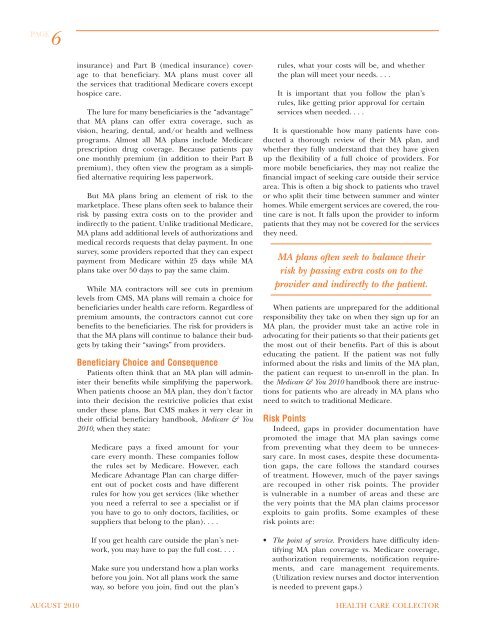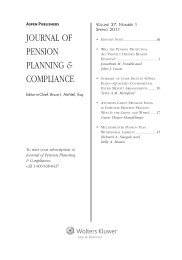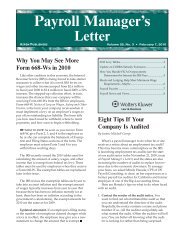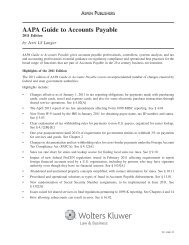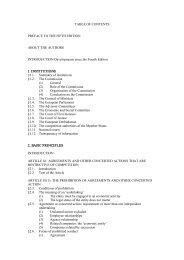Health Care Collector - Kluwer Law International
Health Care Collector - Kluwer Law International
Health Care Collector - Kluwer Law International
You also want an ePaper? Increase the reach of your titles
YUMPU automatically turns print PDFs into web optimized ePapers that Google loves.
PAGE6<br />
AUGUST 2010<br />
insurance) and Part B (medical insurance) coverage<br />
to that beneficiary. MA plans must cover all<br />
the services that traditional Medicare covers except<br />
hospice care.<br />
The lure for many beneficiaries is the “advantage”<br />
that MA plans can offer extra coverage, such as<br />
vision, hearing, dental, and/or health and wellness<br />
programs. Almost all MA plans include Medicare<br />
prescription drug coverage. Because patients pay<br />
one monthly premium (in addition to their Part B<br />
premium), they often view the program as a simplified<br />
alternative requiring less paperwork.<br />
But MA plans bring an element of risk to the<br />
marketplace. These plans often seek to balance their<br />
risk by passing extra costs on to the provider and<br />
indirectly to the patient. Unlike traditional Medicare,<br />
MA plans add additional levels of authorizations and<br />
medical records requests that delay payment. In one<br />
survey, some providers reported that they can expect<br />
payment from Medicare within 25 days while MA<br />
plans take over 50 days to pay the same claim.<br />
While MA contractors will see cuts in premium<br />
levels from CMS, MA plans will remain a choice for<br />
beneficiaries under health care reform. Regardless of<br />
premium amounts, the contractors cannot cut core<br />
benefits to the beneficiaries. The risk for providers is<br />
that the MA plans will continue to balance their budgets<br />
by taking their “savings” from providers.<br />
Beneficiary Choice and Consequence<br />
Patients often think that an MA plan will administer<br />
their benefits while simplifying the paperwork.<br />
When patients choose an MA plan, they don’t factor<br />
into their decision the restrictive policies that exist<br />
under these plans. But CMS makes it very clear in<br />
their official beneficiary handbook, Medicare & You<br />
2010 , when they state:<br />
Medicare pays a fixed amount for your<br />
care every month. These companies follow<br />
the rules set by Medicare. However, each<br />
Medicare Advantage Plan can charge different<br />
out of pocket costs and have different<br />
rules for how you get services (like whether<br />
you need a referral to see a specialist or if<br />
you have to go to only doctors, facilities, or<br />
suppliers that belong to the plan). . . .<br />
If you get health care outside the plan’s network,<br />
you may have to pay the full cost. . . .<br />
Make sure you understand how a plan works<br />
before you join. Not all plans work the same<br />
way, so before you join, find out the plan’s<br />
rules, what your costs will be, and whether<br />
the plan will meet your needs. . . .<br />
It is important that you follow the plan’s<br />
rules, like getting prior approval for certain<br />
services when needed. . . .<br />
It is questionable how many patients have conducted<br />
a thorough review of their MA plan, and<br />
whether they fully understand that they have given<br />
up the flexibility of a full choice of providers. For<br />
more mobile beneficiaries, they may not realize the<br />
financial impact of seeking care outside their service<br />
area. This is often a big shock to patients who travel<br />
or who split their time between summer and winter<br />
homes. While emergent services are covered, the routine<br />
care is not. It falls upon the provider to inform<br />
patients that they may not be covered for the services<br />
they need.<br />
MA plans often seek to balance their<br />
risk by passing extra costs on to the<br />
provider and indirectly to the patient.<br />
When patients are unprepared for the additional<br />
responsibility they take on when they sign up for an<br />
MA plan, the provider must take an active role in<br />
advocating for their patients so that their patients get<br />
the most out of their benefits. Part of this is about<br />
educating the patient. If the patient was not fully<br />
informed about the risks and limits of the MA plan,<br />
the patient can request to un-enroll in the plan. In<br />
the Medicare & You 2010 handbook there are instructions<br />
for patients who are already in MA plans who<br />
need to switch to traditional Medicare.<br />
Risk Points<br />
Indeed, gaps in provider documentation have<br />
promoted the image that MA plan savings come<br />
from preventing what they deem to be unnecessary<br />
care. In most cases, despite these documentation<br />
gaps, the care follows the standard courses<br />
of treatment. However, much of the payer savings<br />
are recouped in other risk points. The provider<br />
is vulnerable in a number of areas and these are<br />
the very points that the MA plan claims processor<br />
exploits to gain profits. Some examples of these<br />
risk points are:<br />
• The point of service. Providers have difficulty identifying<br />
MA plan coverage vs. Medicare coverage,<br />
authorization requirements, notification requirements,<br />
and care management requirements.<br />
(Utilization review nurses and doctor intervention<br />
is needed to prevent gaps.)<br />
HEALTH CARE COLLECTOR


